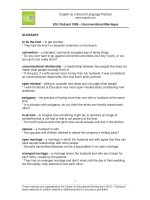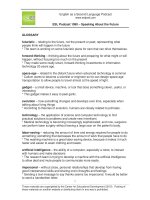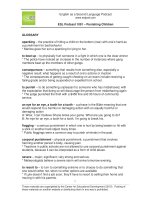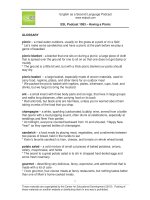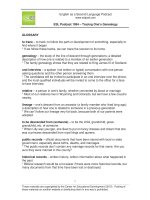ESLPod 1123 guide Want to be Fluent in English?
Bạn đang xem bản rút gọn của tài liệu. Xem và tải ngay bản đầy đủ của tài liệu tại đây (89.74 KB, 9 trang )
English as a Second Language Podcast
www.eslpod.com
ESL Podcast 1123 – Describing Pleasant Scents
GLOSSARY
to smell – to breathe in air through one’s nose to get the flavors that are in it
* Did you stop to smell the roses on your way to work today?
delectable – delicious; with a very good taste
* These cookies are delectable! Would you please give me the recipe?
pleasant – nice; comfortable; providing a feeling of happy and contended
enjoyment
* Walking around the lake was a pleasant way to spend the afternoon.
heavenly – very nice, related to paradise; perfect
* Getting a one-hour massage was heavenly. I can’t imagine anything better.
fruity – related to the tastes and smells of fruit
* Why are all these cough syrups fruity? They should make a chocolate-flavored
cough syrup.
scent – the way something smells, especially when it smells good.
* Rebecca could always recognize the scent of her father, a combination of pine
trees, tobacco, and wood smoke.
perfume – a scented liquid that women spray onto their body to smell good
* Are you wearing vanilla perfume, or did you spill vanilla on your hands while
you were working in the kitchen?
to exude – to convey or display; for something to be emitted or sent out from
oneself or one’s body
* If you want to exude confidence during an interview, use good posture and
wear your nicest clothing.
sexy – sexually attractive; causing others to think that one would be an exciting
and desirable sexual partner
* The office manager told the employees that it is never appropriate to wear sexy
clothing to the office.
to captivate – to catch or capture someone’s attention so that he or she cannot
concentrate on anything else
* Adrian was captivated by the book for several hours.
1
These materials are copyrighted by the Center for Educational Development (2015). Posting of
these materials on another website or distributing them in any way is prohibited.
English as a Second Language Podcast
www.eslpod.com
ESL Podcast 1123 – Describing Pleasant Scents
the opposite sex – the other gender; women for a man, and men for a woman
* In elementary school, some students refuse to play with classmates of the
opposite sex.
fresh – new, clean, crisp, and not used; made recently
* After a long day working in the heat, it was nice to go home, shower, and put on
some fresh clothes.
musky – having the scent of a male animal; having the scent of a type of flower
used for making perfumes
* Bears and other animals can attract females with a musky scent.
detergent – soap used to wash clothes or dishes
* I don’t want my clothes to smell like flowers, so please buy some unscented
laundry detergent.
have it your way – a phrase used to indicate that another person can do what
he or she wants, but one does not agree with it and thinks it is a mistake
* Fine, have it your way, but don’t blame me when your plan fails.
to miss out – to not have an opportunity to have or do something, especially as
a result of one’s own decision or action
* Don’t miss out! Buy a ticket for the circus today!
to lure – to tempt; to bring someone or something closer by offering something
that is attractive or rewarding in some way
* A bad man has been trying to lure children into his car with candy.
to pass up – to decide not to take advantage of an opportunity; to decide not to
have or do something
* Why would you pass up an opportunity to meet your favorite movie star?
2
These materials are copyrighted by the Center for Educational Development (2015). Posting of
these materials on another website or distributing them in any way is prohibited.
English as a Second Language Podcast
www.eslpod.com
ESL Podcast 1123 – Describing Pleasant Scents
COMPREHENSION QUESTIONS
1.
a)
b)
c)
Which of these would smell sweet?
A fruity scent
A fresh scent
A musky scent
2.
a)
b)
c)
What does Kitty mean when she says, “Have it your way”?
She’s going to let Pepe do what he wants.
She’s going to force Pepe to do things her way.
She’s going to make Pepe smell his own clothes.
______________
WHAT ELSE DOES IT MEAN?
fresh
The word “fresh,” in this podcast, refers to something that is new, clean, crisp,
and not used, or something made recently: “You can smell fresh bread as you
walk past the bakery.” Or, “Are these eggs fresh, or have they been on the shelf
for a few days?” The phrase “a fresh start” refers to an attempt to start something
and do it differently, especially because one did something poorly last time:
“Moving to a new city and enrolling in a new school was a chance for Jesse to
make a fresh start.” The phrase “a breath of fresh air” describes something that is
new, exciting, and good: “Getting some younger employees in the office was like
a breath of fresh air.” Finally, the phrase “to get fresh with (someone)” means to
behave in a rude, inappropriate, and possibly sexual way toward another person:
“Peter made a huge mistake by getting fresh with his boss’s wife.”
to pass up
In this podcast, the phrase “to pass up” means to decide not to take advantage of
an opportunity, or to decide not to have or do something: “The hardest part of
being on a diet is having to pass up birthday cake.” The phrase “to pass out”
means to faint, or to lose consciousness: “Crystal was so nervous about
speaking in public that she passed out as she stepped onto the stage.” The
phrase “to pass out” can also mean to distribute, or to give something to many
people: “They passed out free samples inside the grocery store.” Finally, the
phrase “to pass over” means to give a promotion or honor to a lower-ranking
person in an organization: “Ryan was really angry when the company passed
over him to give his assistant the vice-presidency.”
3
These materials are copyrighted by the Center for Educational Development (2015). Posting of
these materials on another website or distributing them in any way is prohibited.
English as a Second Language Podcast
www.eslpod.com
ESL Podcast 1123 – Describing Pleasant Scents
CULTURE NOTE
Scratch-and-sniff Products
“Scratch-and-sniff products” are items that “release” (emit; allow to escape) a
scent when the “surface” (top part) is “scratched” (lightly scraped). The user
scratches the item and then “sniffs” (breathes in air to perceive the odor of
something) it. The technology involves putting very small “capsules” (very small
beads or containers) filled with a scent onto a piece of paper, so that those
capsules “break open” (open and release their contents) very easily when they
are touched.
Scratch-and-sniff products are often “stickers” (a small piece of paper with an
image on one side and an “adhesive” (a sticky substance) on the other side).
Children enjoy putting scratch-and-sniff stickers on their artwork and sharing
them with friends. “Valentines” (small cards exchanged on Valentine’s Day)
sometimes have scratch-and-sniff “features” (characteristics), especially with
strawberry, cinnamon, or vanilla scents.
Sometimes scratch-and-sniff technology is used to educate people. For example,
“utility companies” (companies that provide electricity, water and/or natural gas
services) sometimes put scratch-and-sniff cards into “bills” (written statements of
how much a person needs to pay a company) to teach customers how to
recognize the smell of a dangerous “gas leak” (when gas escapes from a “pipe”
(tube) into the air).
Scratch-and-sniff technology can also be used to sell products. For example,
magazines sometimes have advertisements for perfumes that invite readers to
scratch the ad to smell the new perfume.
One recent use of scratch-and-sniff technology was when “pop star” (a very
popular musician) Katy Perry sold CDs with a sticker that smelled like “cotton
candy” (colored sugar that is very fluffy, wrapped around a stick), matching the
image of cotton candy on the cover of the CDs.
______________
Comprehension Questions Correct Answers: 1 – a; 2 – a
4
These materials are copyrighted by the Center for Educational Development (2015). Posting of
these materials on another website or distributing them in any way is prohibited.
English as a Second Language Podcast
www.eslpod.com
ESL Podcast 1123 – Describing Pleasant Scents
COMPLETE TRANSCRIPT
Welcome to English as a Second Language Podcast number 1,123 – Describing
Pleasant Scents.
This is English as a Second Language Podcast episode 1,123. I’m your host, Dr.
Jeff McQuillan, coming to you from the Center for Educational Development in
beautiful Los Angeles, California.
Visit our website at ESLPod.com. Take a look at our Special ESL Podcast
Courses in Business and Daily English, and read our ESL Podcast Blog each
week. On this episode, we’re going to listen to a dialogue between Kitty and
Pepe about smells – about the way that things smell, the pleasant scents. Let’s
get started.
[start of dialogue]
Kitty: Oh, smell that. Isn’t that delectable?
Pepe: Yes, it’s pleasant.
Kitty: Pleasant? It’s heavenly. It has a nice fruity scent, not too sweet.
Pepe: If you say so. I don’t want to buy anything that has a strong perfume smell.
I’m a guy.
Kitty: I know, but you want to exude a sexy scent that captivates the opposite
sex, right?
Pepe: I’m not sure about that. I just want to smell fresh and clean.
Kitty: All right, how about this one?
Pepe: Uh, it smells musky.
Kitty: Musky is good. Musky is sexy.
Pepe: Not to me. Let’s stick with something basic. I’m buying this one.
Kitty: But that one smells like detergent!
5
These materials are copyrighted by the Center for Educational Development (2015). Posting of
these materials on another website or distributing them in any way is prohibited.
English as a Second Language Podcast
www.eslpod.com
ESL Podcast 1123 – Describing Pleasant Scents
Pepe: Yes, because that’s what I’m buying – detergent for my clothes. I don’t
need any fancy scents on my clothes.
Kitty: Have it your way, but you’re missing out on a chance to lure women with
your scent.
Pepe: I’ll pass up that chance, thank you very much. If I follow your advice and
buy this perfume-smelling detergent, women will definitely get the wrong idea
about me!
[end of dialogue]
Kitty begins our dialogue by saying to Pepe, “Oh, smell that.” “To smell,” of
course, means to breathe air into your nose so you can get the flavor of
something or the “scent” (scent) of something. The scent of something is the way
it smells, especially if it smells good. We often talk about, say, perfume for a
woman as having a certain scent. Kitty says, “The smell is delectable”
(delectable). “Delectable” is another word for “delicious” – something that has a
very good taste.
Pepe says, “Yes, it’s pleasant” (pleasant). “Pleasant” means nice. It means
comfortable, but it isn’t a very strong compliment. It isn’t a very strong idea. If you
say something is pleasant, you mean it’s okay – it’s nice, but it’s not great. That’s
why Kitty is surprised. She says, “Pleasant? It’s heavenly.” “Heavenly” refers to
something that is perfect, something that is really good.
She says, “It has a nice fruity scent, not too sweet.” “Fruity” (fruity) refers to the
tastes and smells of fruit. Kitty is describing something as having a “fruity scent,
not too sweet.” We usually think of fruit as being sweet, as having certain sugars
in it that make it sweet. Pepe says, “If you say so.” We’ve heard this expression
before. When someone says, “If you say so,” he’s really saying, “I don’t agree
with you, but I’m not going to argue with you, either.”
Pepe says, “I don’t want to buy anything that has a strong perfume smell.”
“Perfume” (perfume) is a kind of scented liquid that a woman sprays on her body
to make her smell good. Men don’t normally wear perfume, or at least they don’t
call it perfume. The word “perfume” in English only refers to the liquid that a
woman would put on her body. Pepe says he doesn’t want anything that smells
like perfume. “I’m a guy,” he says – I’m a man.
Kitty says, “I know, but you want to exude a sexy scent that captivates the
opposite sex.” “To exude” (exude) means to convey or display. It’s for something
6
These materials are copyrighted by the Center for Educational Development (2015). Posting of
these materials on another website or distributing them in any way is prohibited.
English as a Second Language Podcast
www.eslpod.com
ESL Podcast 1123 – Describing Pleasant Scents
to be sent out from your body. You could say that a certain person “exudes
confidence.” It’s almost as though the confidence were a scent that was coming
out of the person’s body. The idea is that it’s very obvious. If you exude
confidence, you are a very confident person. You look confident. Well, here we’re
not talking about confidence, we’re talking about a “sexy scent.” “Sexy” (sexy)
refers to things that people consider sexually attractive.
Kitty wants Pepe to have a “sexy scent that captivates the opposite sex.” “To
captivate” (captivate) means to get someone’s attention so that he or she can’t
concentrate on anything else. You may see a beautiful woman and find her
beauty captivating. You can’t focus on anything else. Of course, I’m referring to
your wife or girlfriend. Kitty is trying to get Pepe to captivate the opposite sex.
The term “opposite sex” refers to, for a woman, a man, and for a man, a woman.
Pepe is a little doubtful. He says, “I’m not sure about that. I just want to smell
fresh and clean.” “To smell fresh” (fresh) means the same as to smell new or
clean – not dirty in this case. Kitty says, “All right, how about this one?” Pepe
says, “Uh, it smells musky” (musky). “Musky” means having the scent of a male
animal. Some people think it’s a pleasant smell, some people don’t. Kitty thinks it
is. She says, “Musky is good. Musky is sexy.” It’s how a man should smell,
according to Kitty.
Pepe says, however, “Not to me,” meaning it isn’t good for me. “Let’s stick with
something basic.” “To stick with” something means to concentrate or focus on –
to not try other things. He says, “I’m buying this one.” Kitty, however, says, “But
that one smells like detergent!” “Detergent” (detergent) is soap that you use to
wash either clothing or dishes. Pepe says, “Yes, because that’s what I’m buying
– detergent for my clothes.” Now we learn what Pepe is actually buying at the
store. He’s buying detergent to wash his clothes.
He adds, “I don’t need any fancy scents on my clothes,” meaning he doesn’t
need his clothes to smell of something. Kitty says, “Have it your way.” That’s an
expression we use to indicate that the other person should just do what he or she
wants, but that you would do something different. You are expressing
disagreement with the other person, but telling the other person to go ahead and
do what he or she wants to do.
There was actually a commercial when I was growing up for one of the big
hamburger restaurants – not McDonald’s, but Burger King. Burger King had
advertisements that tried to emphasize that if you went to Burger King you could
get your hamburger made however you wanted it.
7
These materials are copyrighted by the Center for Educational Development (2015). Posting of
these materials on another website or distributing them in any way is prohibited.
English as a Second Language Podcast
www.eslpod.com
ESL Podcast 1123 – Describing Pleasant Scents
Have it your way,
have it your way
at Burger King.
I remember that. That was from, like, the 1970s. Can you believe that? Anyway
that’s how effective advertising can be, you see. You get that song in your head
and you can’t get rid of it, right? Even after 40 years.
Well, back to the story. Pepe doesn’t want to buy the detergent that Kitty likes.
Kitty says to him, “You’re missing out on a chance to lure women with your
scent.” “To miss out on” something is not to have the opportunity to do
something, especially because you’ve made a certain decision. If you’re going to
miss out on the party, you’re going to not have fun at the party with everyone
else because you’ve decided not to go. You’re going to miss out. You’re going to
lose the opportunity to do something good or positive.
Kitty thinks that Pepe will miss out on the chance, the opportunity, to lure women.
“To lure” (lure) means to bring someone closer to you by offering the person
something attractive or rewarding. It could also be used for an animal. “To lure an
animal” would be to get an animal to come close to you, perhaps because you
want to capture the animal. When we’re talking about humans, we often use this
verb when we’re describing making yourself attractive to another romantic
partner or to someone who you would like to be your romantic partner.
Pepe, however, says, “I’ll pass up that chance.” “To pass up” something, or “to
pass something up,” means to decide not to do something or to have something.
He says, “If I follow your advice and buy this perfume-smelling detergent, women
will definitely get the wrong idea about me.” He’s saying that women will think
something different about him than what, I guess, Kitty thinks women will think
about him. It’s confusing. I know.
Now let’s listen to the dialogue, this time at a normal speed.
[start of dialogue]
Kitty: Oh, smell that. Isn’t that delectable?
Pepe: Yes, it’s pleasant.
Kitty: Pleasant? It’s heavenly. It has a nice fruity scent, not too sweet.
8
These materials are copyrighted by the Center for Educational Development (2015). Posting of
these materials on another website or distributing them in any way is prohibited.
English as a Second Language Podcast
www.eslpod.com
ESL Podcast 1123 – Describing Pleasant Scents
Pepe: If you say so. I don’t want to buy anything that has a strong perfume smell.
I’m a guy.
Kitty: I know, but you want to exude a sexy scent that captivates the opposite
sex, right?
Pepe: I’m not sure about that. I just want to smell fresh and clean.
Kitty: All right, how about this one?
Pepe: Uh, it smells musky.
Kitty: Musky is good. Musky is sexy.
Pepe: Not to me. Let’s stick with something basic. I’m buying this one.
Kitty: But that one smells like detergent!
Pepe: Yes, because that’s what I’m buying – detergent for my clothes. I don’t
need any fancy scents on my clothes.
Kitty: Have it your way, but you’re missing out on a chance to lure women with
your scent.
Pepe: I’ll pass up that chance, thank you very much. If I follow your advice and
buy this perfume-smelling detergent, women will definitely get the wrong idea
about me!
[end of dialogue]
Don’t miss out on some of the best dialogues on the Internet, written by our one
and only Dr. Lucy Tse.
From Los Angeles, California, I’m Jeff McQuillan. Thank you for listening. Come
back and listen to listen to us again right here on ESL Podcast.
English as a Second Language Podcast was written and produced by Dr. Lucy
Tse, hosted by Dr. Jeff McQuillan. Copyright 2015 by the Center for Educational
Development.
9
These materials are copyrighted by the Center for Educational Development (2015). Posting of
these materials on another website or distributing them in any way is prohibited.
